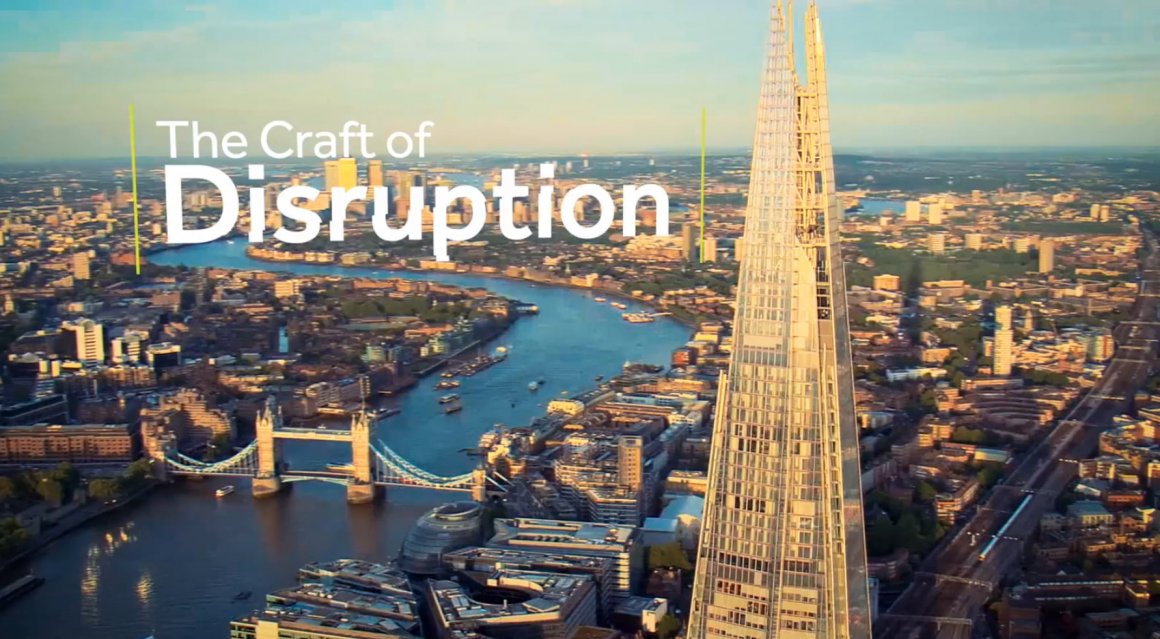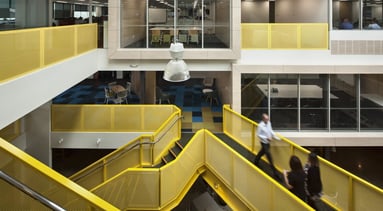
‘The data tells us the four work modes are not necessarily what we thought they were. The office isn’t all about collaboration: 60% of the office is actually where we focus. We are going to challenge what the new office space could look like in the future.’ – Simon Pole, Global Design Director, Unispace
What better place to convene for a symposium on real estate disruption than the Shard? Europe’s largest skyscraper has shifted the polarity of the UK capital, drawing business to the Southbank, an area that was long deemed to be unsuitable for many companies. The development of Renzo Piano’s iconic structure has shaken up the office market in London and it provided an inspirational base for The Craft of Disruption, our latest panel discussion on August 9.
The morning event was arranged to assess the market forces driving significant change in workspace, the trend of co-working and changes to the way space is being occupied by the contingent workforce. The growth in the part-time workforce is having a profound effect on occupiers’ view of space and more than 100 clients attended the debate to hear from our expert speakers and panel debate.
First up was Ben Munn, Head of Consulting at the Instant Group. Using the latest market data he described the growth in co-working and its use by both start-ups and larger corporates. Companies of all sizes are looking to foster collaboration in the workspace and co-working is seen to be synonymous with creating collaborative environments.
Simon Pole, Global Design Director of Unispace and Natasha Bonugli, European Design Director, led the next session giving their candid assessment of the demands on workspace that this new, more agile breed of workers make. How can a progressive approach to design ensure that the “Gigamum” be enticed into a productive workplace that caters for all the pressures on her busy lifestyle?
The trend towards the Gigamum was singled out by Simon and Natasha as being emblematic of the contingent worker: a part-time worker by choice, the various demands on her lifestyle requires the workspace to enable her to be productive, to engage with her workmates in a positive way, and ensure that she can be retained in the workforce for the long-term.
Simon and Natasha gave their insight on how space needs to be better optimised to not only ensure collaboration but also to face up to another key challenge of the 21st Century global city – a lack of space. With vacancy rates among the key locations of the world’s leading cities increasingly compressed, occupier real estate teams require innovation and adaptability to deliver on the demands put upon them by the growth of contingent workers.
Simon points to the use of Liminal Space, or the space between other spaces, and how it can be optimised. Few occupiers can now afford to waste valuable square footage, and creative usage of liminal space, to create areas for collaboration or even space that requires concentration are of paramount importance.
"The data tells us the four work modes are not necessarily what we thought they were," explained Simon of Unispace. "The office isn’t all about collaboration: 60% of the office is actually where we focus. We are going to challenge what the new office space could look like in the future."
The panel discussion, 'Design Science, Design Stories, Design Innovation' featured occupiers from leading firms, representatives from Unispace and also representatives from two firms that are using data in an interesting way to assess workspace culture and improve talent management.
“The biggest impact on the real estate sector is going to come from the movement towards health and well-being,” according to Gareth Lewis of PwC. “Imagine the collective power of 215,000 employees at PwC having access to air quality information, and stress levels, and the employer PwC having access to this data too, to assess productivity.”
Chloe Hamman represented CultureAmp, a firm that is using data and analytics to assess corporate culture and drive employee engagement. She outlined how real time data is now critical in understanding workforce culture and allowing employers to make the right choices for their key asset – their people.
Her views were re-affirmed by Roger Gorman, ProFinda, a company that uses digital platforms to manage workforces and ensure that the best use of talent is in place across large organisations. In his view data and technology are changing the balance of power in companies, saying: “The power is now coming to the employee, it used to be from the Board, but the power has moved.”
The event drew more than 120 guests, including occupiers across the UK and produced engaging debate on some of the key issues facing real estate today. However, the discussion themes run so deep that the morning seemed to be the beginning of the debate rather than being concluded in two hours at the Shard.
In the words of Stuart Cranna, EMEA Director of Corporate Services, BlackRock, said: “The whole workspace is going to evolve and change because technology is enabling people to work in a very different way. We have got to be able to be forward-thinking enough to anticipate what those changes are going to be.”
Hear more about the discussion by watching our two films:
To attend any future Unispace events in the UK, please email Martin Maynard at Martin.Maynard@unispace.com.


